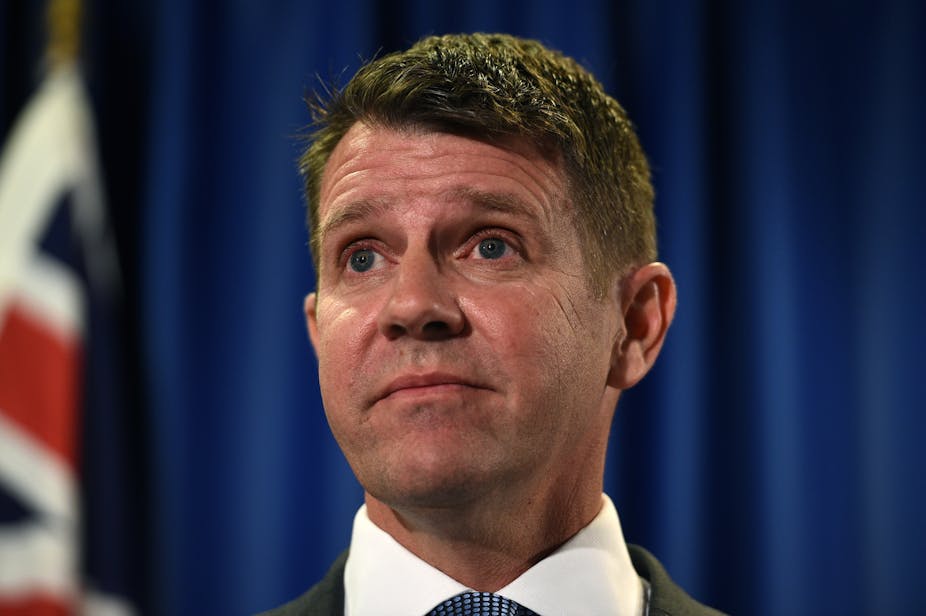I remember thinking, when Mike Baird replaced Barry O’Farrell as premier in April 2014, that the New South Wales Liberal Party had found a safe hand at the wheel. He was young, personable, with considerable experience in banking and business, and respected by both sides of an ideologically divided state Liberal Party.
I considered, at that stage, that his background as an evangelical Christian might even be an advantage.
Perhaps he would be honest and truthful – character traits not often prominent in NSW politics. Perhaps he would be aware of the core of the Christian message found in the sermon on the mount and bring those values into his government and administration.
As it happened, most of my expectations have failed to materialise.
On issue after issue – public hospitals, local government amalgamations, public housing, the lockout laws, and now the greyhound racing fiasco – his government’s decisions have demonstrated bad public policy, clumsy politics, or both. As American voters are finding with Donald Trump, experience in business does not necessarily translate to strong political leadership.
Surprisingly, Baird’s evangelical Christianity has had little impact on his administration. Left-wing Christians, who may have hoped for some social justice initiatives, would certainly be disappointed. Neither has Baird been prominent in promoting the agenda of the Christian Right.
His studies at a Vancouver bible college may affect his political style, but not the policy substance.
Yet Baird is a zealot – not in religious terms, but in his values of economic management. A student of the economics department at the University of Sydney when neoliberal values were completely dominant, he has accepted the dogmas of that faith more comprehensively than any other Australian political leader:
government ownership is bad (let us sell the public hospitals);
government regulation in non-government enterprises is bad (if the greyhound industry can’t regulate itself, then it should be banned); and
the unfettered market will always produce the best public policy (if public housing is unprofitable then sell it off).
These values are a matter of faith, and they lead to a personal conviction of the rightness of one’s decisions which is out of place in democratic politics.
Just to take the issue of greyhound racing as an example, the original decision to ban the whole industry was bad policy because, of the many possible ways of tackling the greyhound industry’s problems, no distinction was made between the minority proportion of cowboys (and cowgirls) who were practising live-baiting and indiscriminate slaughter of animals, and the majority of owners and trainers who were not.
Banning should be the last remedy considered in any industry, not the first.
Equity would seem to demand that if the sins of greyhound owners and trainers merited such treatment, then so would those of the banking industry, the major Australian churches, and the horse racing fraternity, where the corporate sins are arguably worse.
The revised decisions announced on Tuesday are good policy – confronting some of the worst abuses directly, and leaving the threat of a later ban if significant changes are not forthcoming.
Also, the banning decision was bad politics. There was no attempt to prepare the ground for such a radical step nor to convince the public before it was announced – on Facebook. It was simply presented as the right thing to do.
The zealot demands that others should follow him. If Baird had consulted widely before he announced his decision he would have anticipated the massive campaign orchestrated by radio shock-jocks such as Alan Jones and the Daily Telegraph.
But Deputy Premier Troy Grant was even more out of touch; his willingness to support Baird in this is inexplicable except as truly inept politics. Did he not consider what his own backbenchers and constituents would say? Do local and regional issues really have so little concern for the leader of the Nationals?
Former premier O’Farrell, in contrast, while also an economic liberal, inclining to many of those same values, was never a zealot in his politics and would never have mishandled the greyhound issue in the way that Baird has done.
One final point. The mass media and the Labor opposition have been scornful of the Baird about-face. To my mind that is silly. All governments make policy mistakes and become aware of them only when unforeseen consequences occur. If they make bad policy then the right thing to do is correct it.
That Baird has had the strength to back down on something on which he has invested so much political capital suggests that he recognises the dangers of evangelical political leadership. Perhaps we shall see better policy and politics in the future as a result. Or perhaps not.

